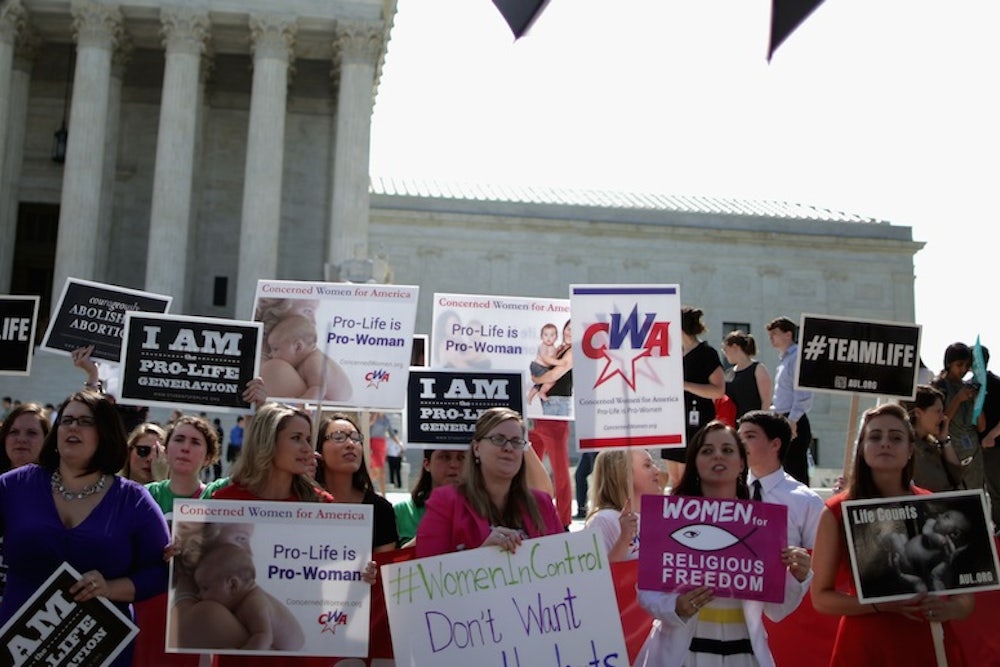We’re still arguing about the Hobby Lobby case. One reason is that we’re still not sure what the ruling means.
The majority opinion, by Samuel Alito, memorably insisted that the decision was narrow and that its effect on access to contraception would be “precisely zero.” Among other things, Alito noted, the Department of Health and Human Services (HHS) had already made special arrangements for the employees of churches and other religious organizations with objections to birth control. All HHS had to do was extend the same program to Hobby Lobby and other, “closely held” for-profit companies whose owners felt the same way. Simple, right?
Maybe not. Late last week, the Court issued an order in another case, this one involving Wheaton College. Wheaton is a Christian school. Administrators there sued, claiming that even the Administration’s special arrangement was a burden, because it requires college officials to submit paperwork to an insurer—thereby implicating the college and its leadership in the provision of birth control to which they object. The Court issued an order supporting Wheaton, which means the College doesn’t have to notify its insurer of its status. Instead, it can merely let HHS know of its objections. At that point, HHS can sort out how to make sure Wheaton employees get birth control coverage. This sparked a scathing dissent from Sonia Sotomayor, who claimed that the order violated the spirit of the original ruling.
The order is not the same as a formal ruling. It’s a temporary move, until the justices can hear the case and make a real decision about whether filling out that paper imposes too big a burden on Wheaton’s administrators. But there’s another issue lurking here, one that’s only now getting attention. How easily can the Administration extend its special arrangement to more employers? That workaround was never ideal and insurers objected to it from the get-go. With a little creative accounting and nudging of the insurers, Obama Administration officials can probably find a way to make it work. It will depend, in part, on how many companies feel the way that Hobby Lobby and Wheaton do. But the task won’t be easy.
A more straightforward option would be to pass legislation. The federal government could, for example, create a program to provide coverage of birth control for people who don’t have access on their own. Relative to the rest of Obamacare, and the health care economy more generally, financing contraception would barely register as a cost. And, in a normal political environment, passing such a law would not be difficult. Democrats would approve because they want to expand access to health services; Republicans would approve because they want to respect the wishes of corporate owners with religious objections to contraception.
But while I’m pretty sure Democrats would go for such an option, I’m pretty sure Republicans wouldn’t. They’d say it’s tantamount to using taxpayer dollars to support “abortifacients”—even though that’s a misreading of the science (as Jen Gunter, an obstetrician, notes at QED today) and such financing already takes place through Medicaid, among other programs. Other Republicans would surely raise a different objection. They don’t want to “support” Obamacare.
It’s actually the problem of health care reform, and of this political era, writ large. There’s an obvious, effective way to solve this problem—and it can’t happen because Republicans don’t believe in that kind of governing. The result will be a second-best solution. It will work, but it will be complicated and imperfect.
- Jonathan Cohn
Things to know about
IMMIGRATION Jeh Johnson, Secretary of Homeland Security, won’t commit to sending Central American children back to their home countries—perhaps because, under law, he can’t. (NBC, “Meet the Press”)
SAME-SEX MARRIAGE A major study from Australia suggests that children of same-sex marriages are actually better off, perhaps because the partners in those couples divide housework more equitably and, as a result, are more likely to stay together. (Judd Legum, ThinkProgress)
OBAMACARE Hundreds of thousands of poor Californians are still waiting for the state government to process their applications for Medicaid. There are more like them in other states. (Helen Shen, Kaiser Health News and the San Jose Mercury News)
Things to read
Split decision. LGBT rights are winning. Reproductive rights are losing. Joan Walsh tries to figure out why. (Salon)
Reformicons are getting taken seriously. Sam Tanenhaus profiles the intellectuals trying to reinvent the Republican Party. (New York Times Magazine)
Pastrami and Prosperity. A look at how Zingerman’s, Ann Arbor’s world famous deli, has developed a business model that gives its employees a voice in management—and a decent standard of living. (New York Times)
Things to watch
The health policy community is bracing for a ruling in Halbig v. Sebelius, a case that could, in theory, rip out the guts of Obamacare for a large portion of the country. The plaintiffs’ case, although far-fetched substantively, got a disturbingly friendly hearing from three judges on the D.C. Circuit Court of Appeals.
Things at QED
Why Hillary Clinton should make paid family and medical leave a centerpiece of her campaign. Also, as mentioned, an obstetrician tries to set the record straight on four controversial forms of birth control—and whether they are really “abortifacients” as religious conservatives claim.
